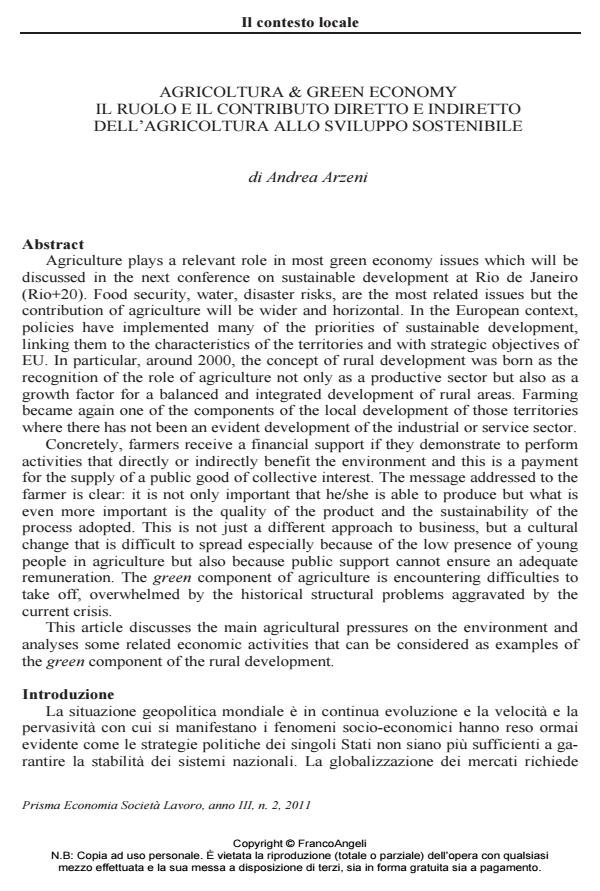Agricoltura & green economy. Il ruolo e il contributo diretto e indiretto dell'agricoltura allo sviluppo sostenibile
Journal title PRISMA Economia - Società - Lavoro
Author/s Andrea Arzeni
Publishing Year 2012 Issue 2011/2
Language Italian Pages 15 P. 95-109 File size 746 KB
DOI 10.3280/PRI2011-002009
DOI is like a bar code for intellectual property: to have more infomation
click here
Below, you can see the article first page
If you want to buy this article in PDF format, you can do it, following the instructions to buy download credits

FrancoAngeli is member of Publishers International Linking Association, Inc (PILA), a not-for-profit association which run the CrossRef service enabling links to and from online scholarly content.
Agriculture plays a relevant role in most green economy issues which will be discussed in the next conference on sustainable development at Rio de Janeiro (Rio+20). Food security, water, disaster risks, are the most related issues but the contribution of agriculture will be wider and horizontal. In the European context, policies have implemented many of the priorities of sustainable development, linking them to the characteristics of the territories and with strategic objectives of EU. In particular, around 2000, the concept of rural development was born as the recognition of the role of agriculture not only as a productive sector but also as a growth factor for a balanced and integrated development of rural areas. Farming became again one of the components of the local development of those territories where there has not been an evident development of the industrial or service sector. Concretely, farmers receive a financial support if they demonstrate to perform activities that directly or indirectly benefit the environment and this is a payment for the supply of a public good of collective interest. The message addressed to the farmer is clear: it is not only important that he/she is able to produce but what is even more important is the quality of the product and the sustainability of the process adopted. This is not just a different approach to business, but a cultural change that is difficult to spread especially because of the low presence of young people in agriculture but also because public support cannot ensure an adequate remuneration. The green component of agriculture is encountering difficulties to take off, overwhelmed by the historical structural problems aggravated by the current crisis. This article discusses the main agricultural pressures on the environment and analyses some related economic activities that can be considered as examples of the green component of the rural development.
Andrea Arzeni, Agricoltura & green economy. Il ruolo e il contributo diretto e indiretto dell'agricoltura allo sviluppo sostenibile in "PRISMA Economia - Società - Lavoro" 2/2011, pp 95-109, DOI: 10.3280/PRI2011-002009